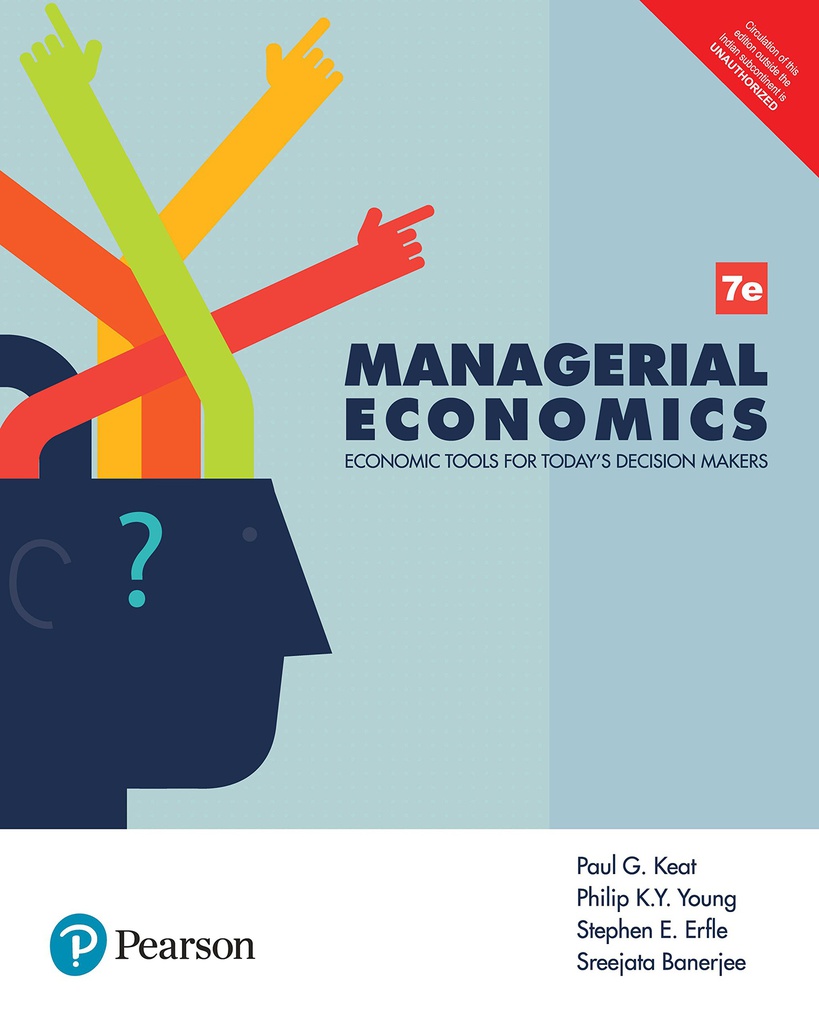Managerial Economics, 7e
The discipline of managerial economics is often considered as “too theoretical and not practical enough for the real world.” The seventh edition of Managerial Economics is an attempt to provide a resourceful supplement to classroom teachings that will help students understand the importance and utility of economic theory for business decision making. This text is designed for upper-level undergraduate and first-year MBA courses in managerial economics and applied economics. In addition to discussing the applications of economic theory to the firm, this text includes chapters on various tools of analysis that are helpful to business decision makers but that are not part of the core of traditional microeconomic theory. These are demand, production and cost estimation using regression analysis, forecasting, capital budgeting and risk analysis. A discussion of linear programming is also available online, along with a review of the time value of money. A review of the mathematical concepts and tools used in the text has been placed on the Companion Website.
Features:
- Excel Applications have been developed for the numerical and graphical illustrations used throughout the text.
- They allow readers to turn the static figures and tables in the text into dynamic illustrations and they will also strengthen students’ ability to use Excel, which we believe is a critical skill in today’s job market.
- Chapters have been updated and a few of them rewritten to include recent developments and in-depth coverage of current topics.
- Valuable inputs and learnings have been provided by outside experts from improve discussions about other topics of importance and current interest in business
- Supply chain systems implementation in companies such as Dell and IBM have also been included to obtain a better idea of the actual challenges of initiating and implementing a supply chain management system.
- A novelty of this edition is a discussion on disruptive technology and its implication.
- This is with reference to the cab hailing application(app) Uber and Ola that have taken the world by storm.
Table of Contents
Chapter 1 Introduction
Chapter 2 The Firm and Its Goals
Chapter 3 Supply and Demand Appendix 3A The Mathematics of Supply and Demand
Chapter 4 Demand Elasticity Appendix 4A Applications of Supply and Demand
Chapter 5 Demand Estimation and Forecasting Appendix 5A The Demand for White Zinfandel in Los Angeles Appendix 5B Understanding Consumer Behavior Through Testing
Chapter 6 The Theory and Estimation of Production Appendix 6A Productivity in Services Appendix 6B The Multiple-Input Case Appendix 6C Analyzing Production Functions with the Use of Calculus
Chapter 7 The Theory and Estimation of Cost Appendix 7A A Mathematical Restatement of the Short-Run Cost Function Appendix 7B The Estimation of Cost Appendix 7C Interview with a Supply Chain Management Executive
Chapter 8 Pricing and Output Decisions: Perfect Competition and Monopoly Appendix 8A The Use of Calculus in Pricing and Output Decisions Appendix 8B Break-Even Analysis (Volume-Cost-Profit)
Chapter 9 Pricing and Output Decisions: Monopolistic Competition and Oligopoly Appendix 9A A Mathematical Restatement of Monopolistic Competition
Chapter 10 Special Pricing Practices
Chapter 11 Game Theory and Asymmetric Information
Chapter 12 Capital Budgeting and Risk Appendix 12A The Value of a Corporation
Chapter 13 The Multinational Corporation in a Global Setting
Chapter 14 Government and Industry: Challenges and Opportunities for Today’s Manager
Chapter 15 The Global Soft Drink Industry Appendix A Statistical and Financial Tables
| Book | |
|---|---|
| Author | Keat |
| Pages | 632 |
| Year | 2017 |
| ISBN | 9789386873286 |
| Publisher | Pearson |
| Language | English |
| Uncategorized | |
| Edition | 7/e |
| Weight | 280 g |
| Dimensions | 20.3 x 25.4 x 4.7 cm |
| Binding | Paperback |


